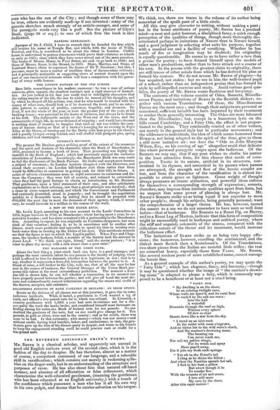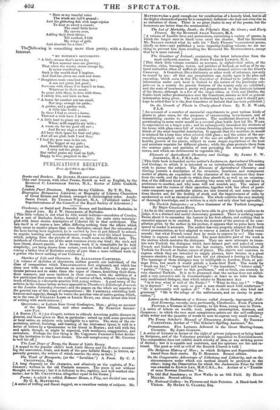THE REVEREND LESINGHAM SMITH'S POEMS.
Ma. &mu is a classical scholar, and apparently not unread in good old English authors even of the second class, which it is the fashion of the day to despise. He has therefore, almost as a matter of course, a competent command of our language, and a tolerable skill in versification ; which consists not merely in reckoning sylla- bles on the finger-ends, but in an understanding of the structure and purposes of verse. He has also about him that natural off-hand manner, and absence of all affectation or false refinement, which characterize the well-educated gentleman, (meaning the gentleman 'who has been educated at an English university,) with a touch of the confidence which possesses a man who has it all his own way in his own pulpit, and deems that he carries salvation on his tongue.
We think, too, there are traces in the volume of its author being somewhat of the spoilt poet of a little circle.
All this may give character to writing, without making a poet ; but in the lesser attributes of poetry, Mr. SMITH has a poetical mind—a neat and quiet humour, a disciplined fancy, a quick enough perception of the qualities of things, though more thoroughly dis- criminated perhaps in imitations of Nature than in Nature herself; and a good judgment in selecting what suits his purpose, together with a musical ear and a facility of versifying. Whether he has much of fire or imagination may be doubted; his originality is equally questionable. He seems to us to have rather a turn than a genius for poetry ; to have formed himself upon the models of other men's productions, rather than to have struck out a course of his own. In the poems with the greatest claim to originality, there are still traces of other minds from which he has derived his plan or formed his manner. We do not accuse Mr. SMITH of plagiary—he has acquired, not stolen : but we see in him the well-trained pupil of a school, rather than an independent genius that has formed its style by self-impelled exercise and study. Amid various good qua- lities, the poetry of Mr. SMITH wants freshness and buoyancy. The contents of the volume consist of Odes, Sonnets, Miscella- neous Poems, and imitations of Beaus in the Scottish dialect ; to- gether with various Translations. Of these, the Miscellaneous Poems are the most racy ; and though their subjects are personal or occasional, sufficient breadth has been imparted by their treatment to render them generally interesting. The Odes are more laboured than the Miscellanies ; but, except in a humorous lyric on the hills round Cambridge, and a Fairy Ode, the effect is not propor- tioned to the pains. They continually remind us of other writers, not merely in the general style but in particular movements ; and the addresses to individuals, the idea of which seems borrowed from HORACE, not being adapted to the spirit of the time, give to them a still more imitative air : nor does the "Ode to John Marryon Wilson, Esq., on his coming of age" altogether avoid that delicate line where personal panegyric verges upon the ludicrous. Of the Sonnets we may say, that if any poet wishes to clothe his matter in the least attractive form, let him choose that mode of com- position. Exotic in its nature, artificial in its structure, con- strained in its rhymes, and unmusical in its pauses when pauses are attempted, the strength and flow of the heroic couplet are lost, and from the character of the versification it is almost im- possible to attain grace or lightness. Great weight of thought always possesses an innate attraction, and powerful ideas enforce for themselves a corresponding strength of expression ; sonnets, therefore, may impress from intrinsic qualities apart from form, but we suspect that some power of pleasing is always lost. Mr. Smrrn's Sonnets strike us as being equal if not superior to most other people's; though his subjects, being generally personal, want the comprehension of a larger theme. He has, however, turned the sonnet to a use we do not remember to have seen so well done before—that of burlesque. His Sonnets to a Roast Pig, on Sherry, and to a Roast Leg of Mutton, indicate that this form of composition might be successfully used in burlesque and satirical poetry, where the stiff and ungainly solemnity of the stanza, compared with the ridiculous nature of the theme and its treatment, would increase the ludicrous effect.
The imitations of Beaus strike us as being very happy effu- sions ; the humorous, however, excelling the sentimental, and the dialect more Scotch than a Scotehman's. Of the Translations, two short pieces from the Italian are tasteful little trifles ; the rest are somewhat heavy, especially those from 'Luso. Mr. SMITH, like several modern poets of more established name, cannot manage the heroic line.
As a general example of this author's poetry, we may quote the " Fairy Ode " ; which has elegance, fancy, and harmony,—though it may be questioned whether the image of "the mariner's drown- ing moan" is adapted to please a fairy, which is commonly sup- posed to be a beneficent or at least not a cruel being.
"FAIRY ODE.
"My dwelling is on the shore,
In an echoing twilight cave, Whose walls are spared, and its coral floor Is wash'd by the salt sea-wave : Into the ball A waterfall Descends through the roof on high, Whence every sphere Of dew so clear Shoots down like a star from the sky.
"1 stand on an islet-rock In the midst with moss o'ergrown, And on tiptoe list to the wild wave's shock, And the mariner's drowning moan.
The foaming sea Can never reach me, Nor soil my golden wings; For its wrath and spray Have pass'd away, Ere it join my fresh rock-springs.
" Yet oft to the Petrel's tail I cling as he skims the billow ; And when the Nautilus spreads her sail, I find in her boat a pillow.
But sweet though it be To wander free With the tenants of air and ocean, I love still more My cave by the shore, After this raped motion ! " Here at my tuneful voice The winds are lull'd around ; And the glittering fish with leaps rejoice To hear so sweet a sound; The small birds hover My cavern over, Adding their rival chime; Till soothed, I fold My wings of gold, And slumber for a time!"
The:following is something more than pretty, with a domestic
Interest.
"MY MOTHER'S SENTIMENTS.
"A little stream that's never dry When summer suns are glowing ; That when the wintry storm sweeps by, Is never overflowing : Such is the wealth that I implore, And God has given me such and more.
"Daughters more excellent than fair ;
A son not great, but good;
Servants with whom I've leaned to bear, Whatever he their mood: In peace with these, in love with those, I calmly live, and have no foes.
"A house for comfort not too small, Not large enough for pride ; A garden, and a garden-wall, A little lake beside ;
In these I find so sweet a home,
That not a wish have I to roam.
"A little land to graze my cow, Whose milk supplies my table ; A warm sty for my good old sow ; And for my nags a stable : All have their space for food and play, And all are glad, both I and they.
"I feed the poor man in his cot, The beggar at my gate ; And, thankful for my quiet lot, I envy not the great ; But rather praise my God on high, Happy to live, prepared to die."



























 Previous page
Previous page